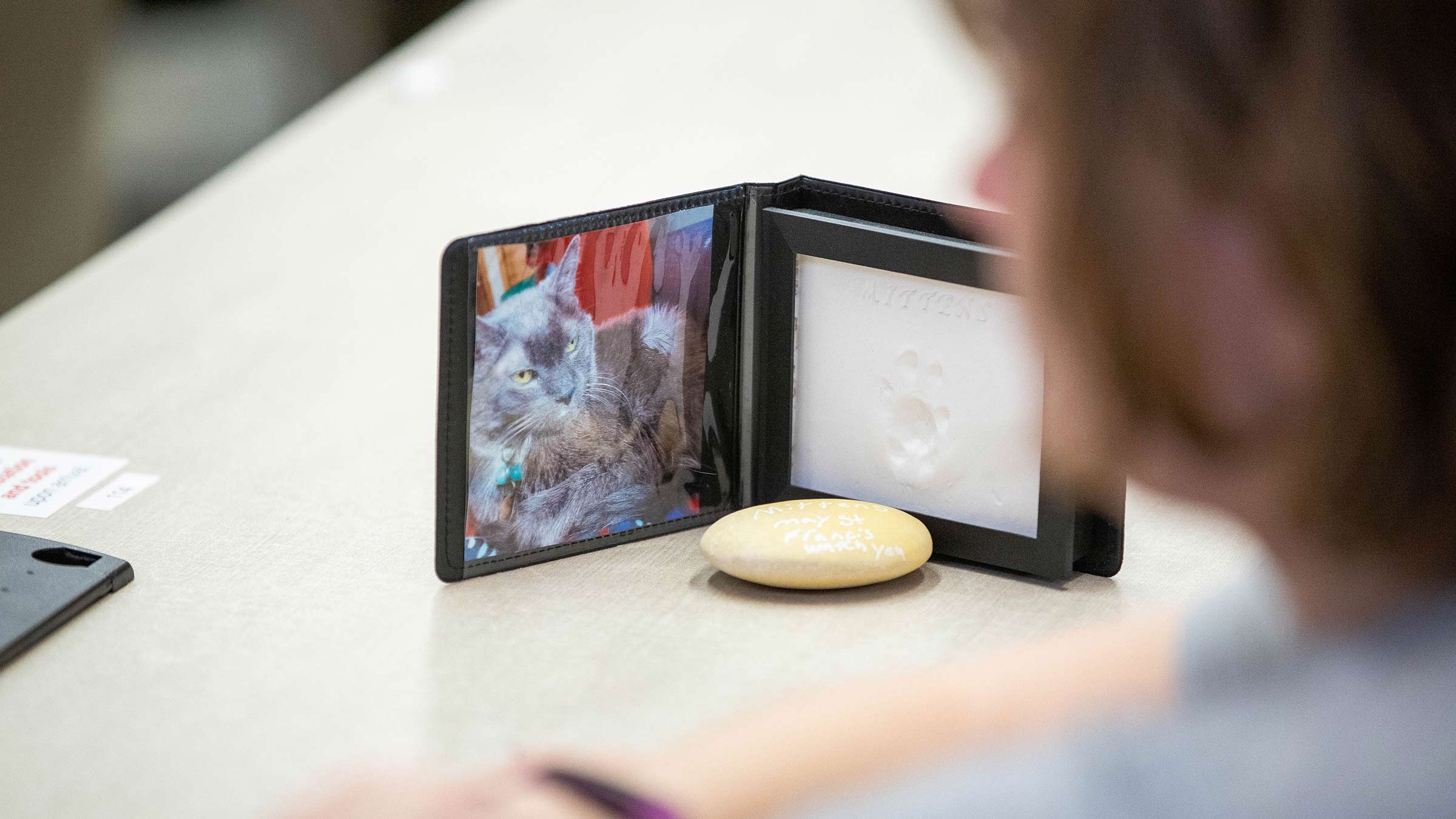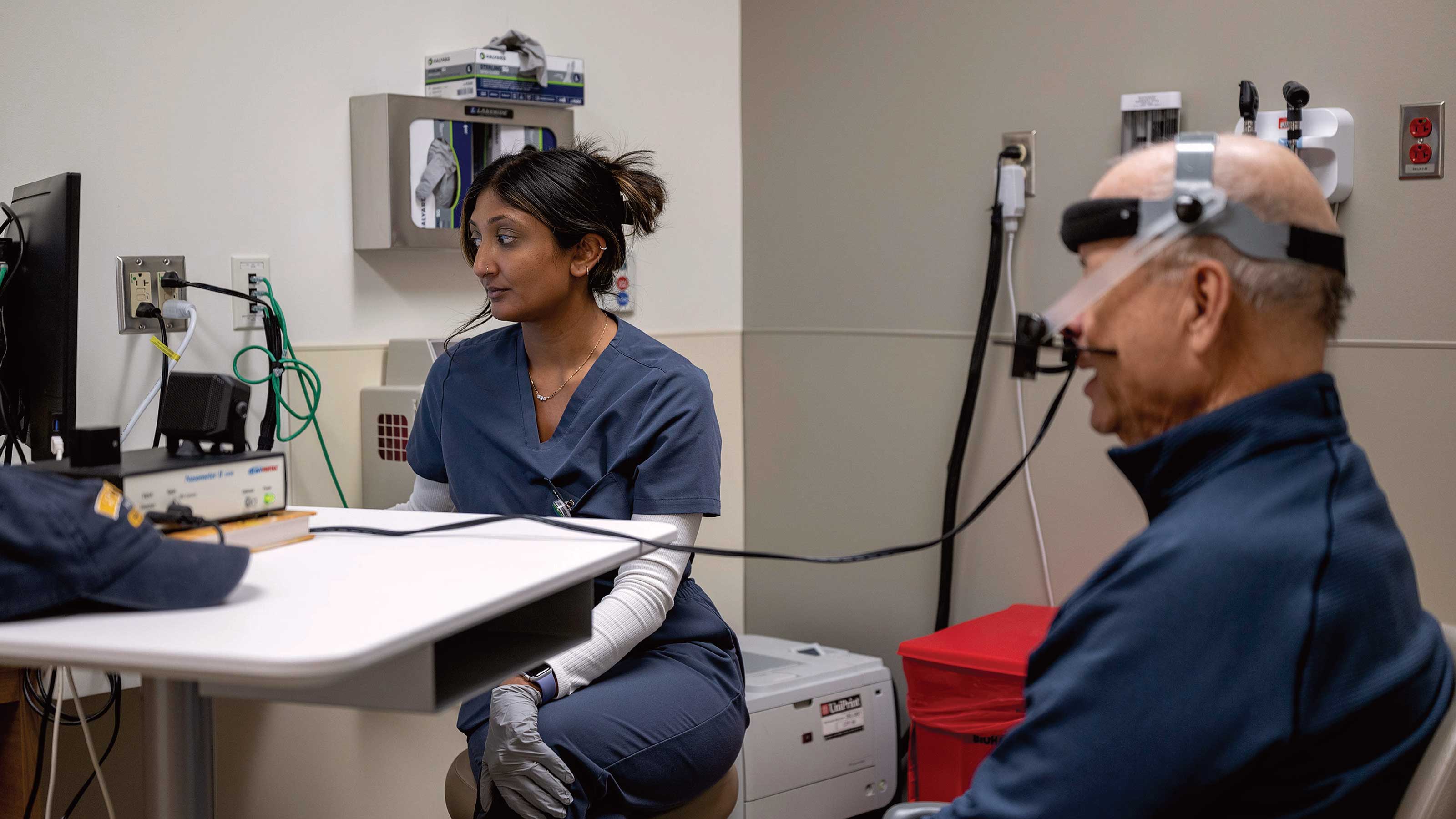Struggling with end-of-life pet care and grief is normal, and there are ways to cope with loss

When a pet dies, it’s not unusual to feel isolated or alone or find that others don’t understand why you’re so distraught. But it’s perfectly normal to grieve when you lose a pet. Since 2009, the Honoring the Bond program has held an annual remembrance ceremony or provided an online remembrance for bereaved clients of The Ohio State University Veterinary Medical Center. The program honors the strong bond that exists between pets and their owners and recognizes the need for support and guidance for clients facing the end of a pet’s life. It’s one of only about six dozen programs in North America that provide veterinary social work services to help clients work through the hard decisions and emotions that arise when a pet is sick or dying.
Read on for answers to common questions about grieving for pets and ways to cope with loss.
Why do we grieve when pets die?
Pets give us something most people can’t: complete, unconditional, nonjudgmental love. When they‘re gone, it leaves a hole and brings grief, much like the grief we feel when a human loved one dies. Pets are such a huge part of our lives, sometimes in places we don’t share with most family members, including our beds, and the bond formed between owner and pet is incredibly strong.
How is the grief we experience with the loss of animals the same as the grief we experience with the loss of people?
Just like with humans, the extent of the grief we feel is dependent on the type of relationship we had with the pet. We may not feel as strongly or grieve as deeply for one person compared with another, and the same holds true for pets. If a person has multiple pets, the grief experienced over the loss of one may be different from the grief experienced over the loss of another.
The emotions that people feel, the sadness, and maybe anger, are often very similar to the emotions felt when grieving the loss of a person.
How is it different?
Circumstances can be different with pets, specifically when the pet dies through euthanasia. Often with pet loss, the reason we must make the euthanasia decision is because of finances — maybe we can't afford the surgery. And so that's not typically something that we encounter in human medicine.
But making a decision to euthanize a pet for any reason can sometimes cause guilt. In fact, I’d say guilt is the biggest emotion I see with pet loss, even if people know they’ve made the right decision. It's still just an enormous burden for some people, and they have questions: Why should it be in my hands to make that decision?
What should I consider when faced with a euthanasia decision?
1 Quality of life
Consider using a quality-of-life scale to help focus on the pet’s quality of life and also your own. There are times when humans are providing so much care for an animal that their own quality of life is suffering, they aren't able to leave the house, or they're not able to take vacations or have friends over. It's OK to look at those things.
2 Consider the timing of the euthanasia and how you will decide when it's time
A pet’s death is inevitable. We know it’s coming, and we don't have any control over that. But we do have some control over what death will look like. Overwhelmingly, more people feel like they wait too long. Tap into resources that help you plan for the death that feels best for you and your pet.
3 Explore additional resources
Find resources on the Pet Loss Suggested Reading List.
Tips for coping after a pet dies
1 Don’t stuff away or ignore feelings of sadness or guilt
Allow yourself to feel. People sometimes say, “You just need to keep busy, so you don't feel bad.” The reality is that you need to feel those sad feelings, you need to feel upset, you need to feel angry. Those emotions need to come out, because that's how we get through our grief. Shoving it away or putting it up on a shelf isn't usually effective. It’s important to look at it straight on at some point.
2 Focus on the positives, the good times, your love for your pet and the things you were able to do
When you look at the whole scheme of things, the euthanasia or the period of death accounts for such a short time. Consider the balance. The death is really intense and really hard over a short period of time, but if you go back and think about your pet’s whole life, the good times definitely outweigh the bad times. It's just that the intensity might be much harder right now. The hope is that you do progress in your grief, so you're not feeling as intensely over time.
3 Memorialize your pet
You may want to do something privately with your family, post something on social media, plant a tree or make a donation in your pet’s name to a pet shelter or veterinary clinic. Write down funny stories. Make a photo collage or photo album. Journal about happy memories of your pet. Pet loss journals and other grief materials are available. Find additional suggestions at Animal Remembrance Ideas.
4 Find others you can talk to who really understand
It’s important to know not only who to talk to but also who you may want to avoid during those times. There might be people who don't really understand your grief.
5 Consider extended therapy or counseling
If you continue to have intense feeling and you feel stuck, like you're not progressing or moving forward, reach out to a professional for extended therapy or counseling.
6 Additional resources to help you cope
Find additional guidance in the Coping with the Loss of a Pet brochure.
Do other pets in the home grieve?
It’s hard to know, because they can't really tell us. But it’s said that animals in general go through a grieving process. Just as for people, it’s dependent on the relationship. We recommend that owners monitor how a surviving animal is doing. Is behavior changing? Is the pet eating less? If you see things that are concerning, call the veterinarian or try to connect with a veterinary behaviorist. Your pet may be going through a grief process and could potentially benefit from medications or other treatment.
Should I get a new pet after a pet dies?
When deciding whether to get a new pet, consider the feelings of each family member and try to make sure everyone is on the same page. The typical recommendation is to avoid making any rash decisions or rushing out to get another pet. Some owners may live alone, with pets their only companions, and they feel a more urgent need to get another pet to help with loneliness. However, it’s important to understand that you cannot replace the pet you lost.
And take care in making decisions for others: If a friend loses a pet, don’t run out and get a new one as a gift. That may not be what your friend wants.

Compassionate, cutting-edge care for your pets
At The Ohio State Veterinary Medical Center, our top priority is making the world healthier for animals and the families who love and care for them.
Learn more about our services




